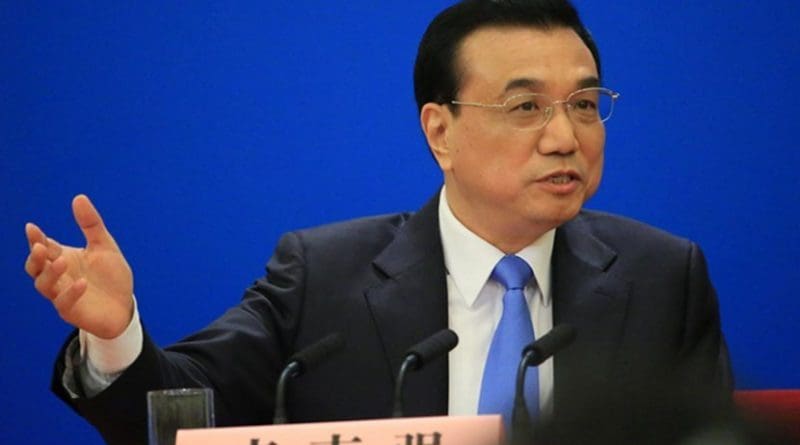China’s Li Keqiang Doubles Down On Economic Globalization
China is committed to building an open economy within the framework of globalization, said Li Keqiang, Premier of the People’s Republic of China, at the opening plenary of the World Economic Forum’s 13th Annual Meeting of the New Champions.
Premier Li reaffirmed China’s readiness to work with the international community to steer economic globalization.
“We now live in a world of profound interdependence,” he stressed. “Countries rely on each other’s markets. No country can single-handedly provide all resources … or offer all needed goods to consumers. Nor can any country sustain its development in isolation from the global system.”
Li underlined that “fundamental principles, such as free trade, must be upheld.”
Premier Li committed to measures that would facilitate the further opening of China’s economy. “We will move up the lifting of foreign ownership caps in securities, futures and life insurance,” he said, also pledging that restrictions on foreign investment in the technological sector will also be reduced.
“This is China showing to the rest of the world that we are determined to carry forward our opening up,” he reiterated. Li also encouraged foreign investment in advanced manufacturing, and further opening of China’s financial services.
The premier doubled down on commitments to stabilize the renminbi exchange rate, to not devalue the renminbi, to strengthen IP protection, and to open up additional sectors to foreign investment.
“The world economy stands to benefit from a more open China,” Li concluded.
The premier identified risk factors to the global economy, including “the slowdown of international trade and investment, the rise of protection, and growing uncertainties and destabilizing factors,” adding that “we all need to take proactive measures to cope with them.”
“In the face of slowing economic growth,” Li said, “we must live the spirit of partnership, as we are passengers in the same boat.”
Premier Li acknowledged problems that have arisen in a globalized economy, including lack of equality. “We cannot simplistically make a scapegoat of economic globalization,” he chided, but instead must “guide globalization in the direction of … inclusive growth.”
In his introductory remarks, Klaus Schwab, Founder and Executive Chairman of the World Economic Forum, noted heightened geopolitical tensions that threaten globalization and multilateralism.
“The world needs more globalization, not less,” Schwab stressed, in an interlinked and interdependent age.
“We are clearly living in challenging times,” he said, “where we need the wisdom and experience of different stakeholders to come together for the common good.” The world is in a time of transition, he noted: no longer in a bipolar or unipolar world, but not yet in a multipolar world.
Schwab called for “a new type of globalization, Globalization 4.0, which must accept diversity, and must accept that different nations have different concepts for development.”
Premier Li also emphasized that globalization is an irreversible trend, “benefiting not just China but also the rest of the world,” enabling new forms of business and promoting international division of labour.
“With inclusive development,” he summarized, “we will be able to achieve win-win results,” he concluded.
In opening the session, David Aikman, Chief Representative Officer for China and Member of the Executive Committee at the World Economic Forum, identified regional competition, economic disparity and technological disruption as key challenges for the future, and stressed cooperation within the theme of Leadership 4.0.
Tang Yijun, Governor of Liaoning Province, praised the World Economic Forum as “an important platform to share ideas and wisdom” in the international community. China “will uphold the flag of our opening up even higher,” he said. “We will not slack in our efforts.”
The World Economic Forum’s 13th Annual Meeting of the New Champions took place on 1-3 July 2019 in Dalian, People’s Republic of China.

